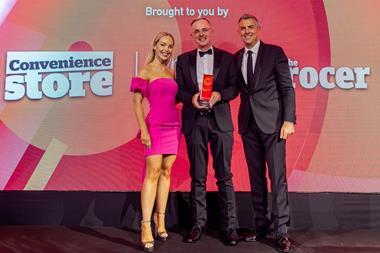Dan Cock, Whitstone Village Stores, Devon
Dan is planning to introduce a traffic light system to show staff where they are performing well and where they need to improve
Lesley Ovington, myCostcutter Insch
Her positive attitude and praise mean that Lesley’s staff feel valued and happy, and so ensure their customer service is top notch
Andrew Porter, Eurospar Creighton’s of Finaghy, Northern Ireland
A monthly newsletter keeps staff involved in the business and feel like part of the company
Binny Amin, Londis Blean and Budgens Whitstable, Kent
An employee of the month scheme ensures Binny’s staff are rewarded for their hard work
Why is it important to your business that your staff feel motivated?
Dan: Ultimately, if they work hard and are successful then the business will benefit. It’s the old carrot and stick debate. Sometimes you have to use the stick, but usually it works better to give a carrot.
Lesley: Motivating staff means that they are happy, so there’s always lots of banter and this works its way along to the customers, who get better service.
Andrew: They perform better if motivated - service is improved, they are more productive and they merchandise to a higher standard.
Binny: The staff are key to running the shop. If they are happy then you’ll get more out of them and they’re more willing to learn. Productivity levels go up a lot when they are all working in sync and they leave their problems at the door. The customers notice when staff are happier.
How does motivating staff improve your store as a workplace?
Dan: It gives staff a real lift to be praised and it’s imperative that they feel valued. We’re very lucky as we have low staff turnover. Our absenteeism is low and people are always willing to step in and take extra shifts.
Lesley: Motivating staff means they want to stay; here it keeps them loyal to the business. Our shortest serving member of staff has been here seven years!
Andrew: Motivated staff get on with each other better team work is improved and I have fewer HR issues to deal with. They are also more likely to stay in the business. Staff recruitment is challenging so retention is a big thing.
Binny: When we took over the Budgens store, morale dropped because staff didn’t know what to expect. We had a ‘lock-in’ in the store where we discussed our issues so that they knew that their opinions mattered.
Besides rewarding them with gifts, how else do you interest your staff in the business?
Dan: We give staff ownership of tasks and recognition - just saying thank you, you did a good job. It’s also important for them to understand why
Motivating staff means they want to stay; here it keeps them loyal to the business. Our shortest serving member of staff has been here seven years!
Lelsey Ovington, myCostcuter Insch
Lesley: If someone shows willing, then we’ll let them look after a category. This gives them more responsibility and they take real pride in their area. They’re doing the ordering so they know which products are performing well.
Andrew: Communication is an important issue, such as making staff aware of what’s going on in the company. It would be easy for part-time staff to get lost in the company, so we have started sending out a newsletter along with their pay packet to help keep staff up to date with company news so that they feel involved.
Binny: I teach them anything and everything - I show them how their actions affect the overall business. We set budgets for individual store sections and get staff to help manage that area and order the stock. It gives them commercial knowledge and they see how to drive profit. When the store was owned by Budgens, the cashiers would only know how to do cashiering, whereas now everyone does everything - work the till or run the bakery. We also have section managers and they get protective over their areas and like things done in a particular way, which is good. They take a lot of pride in their work.
What training do you offer staff in order to help motivate them?
Dan: We put them all through basic hygiene training, but we’re always supportive of further training and we’ve had staff who have done diplomas. If people want to make a career of retail and study for an NVQ then we’ll get behind them.
Lesley: We don’t currently offer NVQ training, but this is something that I’d like to bring in.
Andrew: Hendersons has developed the Spar Academy so there is a training department where staff can have additional training.
Binny: NVQ programmes are available to everyone and the staff doing them tend to work smarter. Those studying for NVQs at my Budgens store go back to the shop and share their knowledge with the team.
Do you encourage staff to achieve team targets or individual goals?
Dan: We’re going to set up a performance management scheme for individuals where staff will receive red, amber and green scores, depending on whether they are meeting the requirements or whether there is room for improvement.
Lesley: It’s more of a team effort. I’ll tell the team how our weekly sales are doing and I’ll try to get them to grow this week on week.
Andrew: We tend to set more of a team target. We have supervisors looking after grocery, fresh and deli departments and they each manage their own areas and set targets for these and then review them every week.
Binny: We have a mix of individual and team targets. If there’s a product that we want to sell, we’ll say that the best seller is rewarded. When we hit our target for weekly sales after taking on the Budgens store we took everyone out for a meal.
Where do you get ideas on how to motivate your staff?
Dan: Talking to other retailers and business people, and also looking at what the multiples are doing.
Lesley: I’ll look at trade magazines and go to other stores for ideas, and when we’re deciding on a night out to reward staff then everyone gets a say on where we go.
Andrew: As a management team we are pro-active and enthusiastic and we’re always challenging each other to do better.
Binny: I speak to a lot of retailers and read the trade press for ideas, but it’s generally a case of treating people how I would like to be treated myself.
How much time and money do you spend on staff incentives and motivation?
Dan: I probably spend two or three days a month talking to staff and working with them on their reviews and monitoring their progress, plus having little chats each day.
Lesley: We don’t spend much money on motivating staff, but I motivate them all the time - it’s an on-going process. If someone has done a good job in their category - kept it really clean, or displayed new items well - then I’ll tell them they’ve done an excellent job.
Andrew: The prize draw to win a helicopter ride was a one-off, but generally we’ll spend a couple of thousand pounds to be with the Spar Academy. In terms of time, you’re doing it every day by developing a culture in the workplace. Having a good management structure means it’s not all down to me -all the category managers motivate their own teams.
Binny: In terms of time, it’s constant. We’re always looking at how staff are doing. In terms of money spent on motivating employees, it can be between £100 and £1,000. Managers will be on a salary bonus if they hit their targets, but incentives can also be smaller, such as giving shopping vouchers.
What has been your most successful staff motivation technique?
Dan: The leader board of lottery sales - it just brings out staff’s competitiveness. Money isn’t everything - just to be made to feel valued and have their hard work acknowledged makes a big difference.
Lesley: Being positive every day is the most important thing. It’s about acknowledging their good work and giving feedback.
Andrew: In the past year, we’ve promoted two guys on the shop floor to supervisor positions. They’ve come on really well because of the added responsibility. It has empowered them to make their own decisions and push the staff they work with.
Binny: Getting them involved in the whole of the business has resulted in the biggest change. I used to work with my father-in-law who came from the old school where you were trained to do one job and management did the cashing up. By showing staff different areas of the business, they have the confidence to work with me better.
How do you assess the progress of your staff?
Dan: We have six-monthly personal development meetings where we sit down one-on-one and look at their strengths and weaknesses. These meetings are a really good opportunity to hear if there’s anything they want to change.
Lesley: We sit down with staff for a one-on-one every couple of months and discuss how they are getting on. We want to challenge them and get them excited, so I am in talks with store owner Nicholas Kelly about introducing upselling targets.
Andrew: We look at levels of accuracy and sales of various categories, and we organise our own mystery shopper initiative with a local company every month, as well as those run by BP and Hendersons. Recently, Hendersons turned up with a hidden camera mystery shopper!
Binny: We do monthly reviews and work out training needs. We used to do it annually, but that wasn’t frequent enough. We’ll look at sales, merchandising and customer interaction - everyone has a different set of tasks that we monitor. I have a panel of mystery shoppers who are regular customers, so they give pointers on where people can improve, such as if someone is really friendly, but not making eye contact, and we feed that back to our staff.
How do you incentivise your staff?
Dan: We’ve given staff a sales target for the lottery, and we print off a sales report each week and make a score table. They really like it and want to be in the top five sellers. We also give them a staff discount. In the past we’ve taken staff out to Plymouth to buy uniform and then out for lunch, and we take them out for a Christmas celebration, too.
Lesley: I always give praise where praise is due. For example, if someone has put together a good display, then I’ll make sure I let them know. We also have staff nights out when the store has done well at awards as it is a team achievement.
Andrew: We hold staff appraisals once a year as well as having nights out, and the business owner arranges a staff barbecue in the summer. This year there was a prize draw at the barbecue and the nine staff who were picked were treated to a 15-minute helicopter ride!
Binny: We have various financial incentives, and set performance targets for displays and rate of sales. We also have an ‘employee of the month’ nominated by the store manager, and they get gift vouchers and a bottle of wine and chocolates.
What would your advice be to other retailers who aren’t motivating their staff?
Dan: Your staff represent you and your business and if you aren’t treating them properly then where’s the incentive? Staff motivation is an investment. Supermarkets offer greater pay, so for our staff to stay with us tells us we must be doing something right.
Lesley: You can’t expect people to work well if you aren’t pro-active yourself. I don’t ask them to do anything that I wouldn’t do myself.
Andrew: Every retailer knows that the number-one skill is customer service, and motivation is the same - if you aren’t doing it, you’re missing out on sales growth and customer service.
Binny: If they aren’t motivating their staff, then why not? Motivating staff really pays off.






















![C-Store_Champions_logo-CHOSEN[1] 2023](https://d2dyh47stel7w4.cloudfront.net/Pictures/380x253/6/5/7/301657_cstore_champions_logochosen12023_817064.jpg)




No comments yet